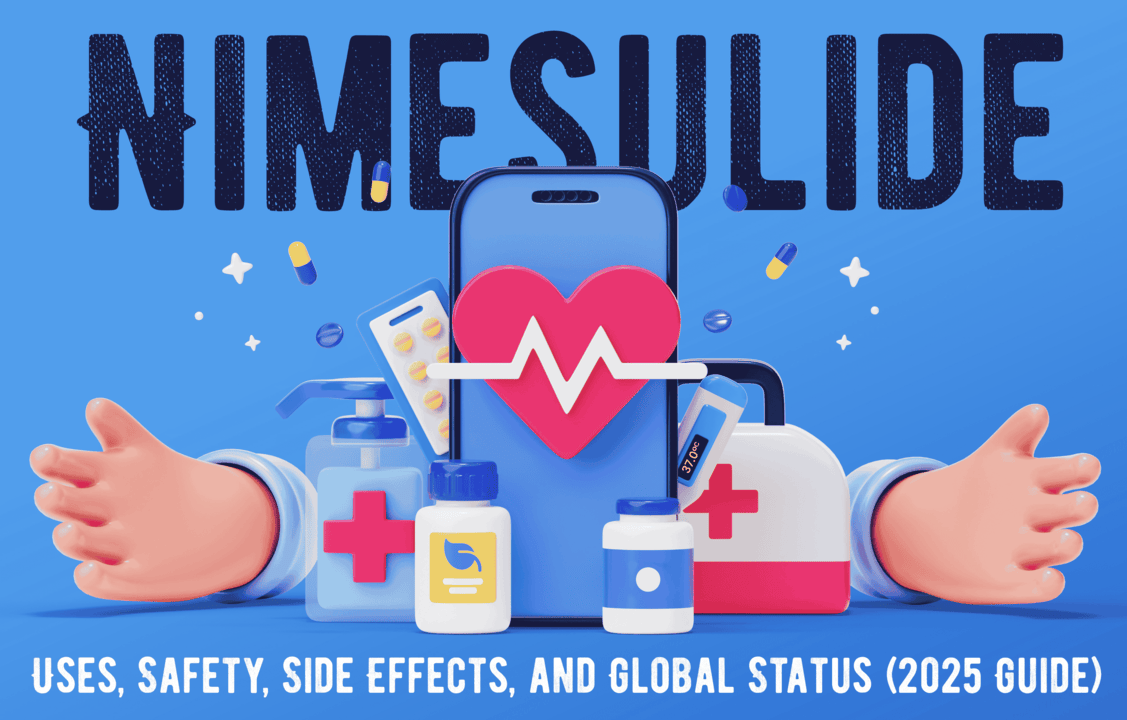Nimesulide is a well-known pain relief medication commonly used in India and a few other countries, but banned or restricted elsewhere. If you’re considering nimesulide for pain, inflammation, or fever, or are simply curious about its regulatory status and health effects, this 2025 guide covers everything you need to know.
What is Nimesulide?
Nimesulide is a non-steroidal anti-inflammatory drug (NSAID) designed to manage pain, inflammation, and fever. It’s often prescribed for:
- Joint and musculoskeletal pain (like arthritis)
- Menstrual cramps (dysmenorrhea)
- Dental pain or pain after injuries
- Fever (especially when other options fail)
Nimesulide works by selectively inhibiting the COX-2 enzyme, reducing the production of inflammatory chemicals called prostaglandins. This results in pain relief and reduced swelling.
Main Uses of Nimesulide
- Osteoarthritis and arthritis pain
- Acute musculoskeletal pain
- Menstrual pain relief
- Post-operative and dental pain
- Fever reduction (when other drugs are ineffective)
Note: Usage should always be on a short-term basis, under a doctor’s supervision.
Major Side Effects and Risks
1. Liver Toxicity (Hepatotoxicity)
The most critical risk of nimesulide is liver damage, which can appear within days of use. Severe cases may lead to liver failure, requiring transplantation or resulting in death.
2. Digestive Issues
- Nausea, diarrhea, and vomiting
- Gastric bleeding — typical of NSAIDs, especially at higher doses
3. Skin Reactions and Allergies
- Rash, itching, or severe and rare allergic responses
4. Other Risks
- Dizziness, headaches, or elevated liver enzymes in blood tests
Who Should Avoid Nimesulide?
- Children under 12 years (banned for pediatric use in India)
- Those with pre-existing liver, kidney, or heart problems
- Pregnant or breastfeeding women
- People with a history of ulcers, stomach bleeding, or severe allergies to NSAIDs
Dosage and Safe Use Guidelines
| Recommended For | Dose | Key Considerations |
|---|---|---|
| Adults | Up to 200 mg/day | Strictly for short-term use (<15 days) |
| Children (<12) | Not permitted | Ban enforced due to safety concerns |
- Always take nimesulide after meals to minimize stomach irritation.
- Never use without prescription or for extended periods.
Alternatives to Nimesulide
Safer, commonly recommended alternatives for pain and fever include:
- Paracetamol (acetaminophen)
- Ibuprofen
- Aceclofenac
These offer similar relief for most mild to moderate pain situations and have a better safety profile, especially for children and those with liver issues.
Global Regulatory Status: Why is Nimesulide Banned Abroad?
| Country/Region | Status | Reason |
|---|---|---|
| United States | Not approved | Severe liver toxicity |
| UK, Canada, Australia | Not approved / Withdrawn | Severe liver reactions and lack of benefit over safer drugs |
| EU (Select countries) | Temporarily available (max 15 days), otherwise withdrawn | Hepatotoxicity concerns |
| India | Available for adults, banned for children | Periodic safety reviews, ongoing monitoring |
- Many countries have withdrawn nimesulide due to multiple reports of severe, sometimes fatal, liver injury.
- In India, adult use persists due to perceived benefits and lack of wide alternatives, but with strong prescription control and warnings.
Frequently Asked Questions on Nimesulide
Is nimesulide safe for long-term use?
No. Prolonged use, even at normal doses, greatly increases the risk of serious liver damage and stomach bleeding.
Can children take nimesulide?
No. Nimesulide is banned for pediatric use in India and not approved for children in most countries due to the increased risk of liver toxicity and other side effects.
Why is nimesulide still available in India?
India’s regulators weigh benefits and risks differently, focusing on access and controlling use, but experts advise against self-medication and strongly recommend alternatives for most patients.
Key Takeaways
- Nimesulide is effective for short-term pain and fever relief but carries a significant risk of liver toxicity and other side effects.
- It is banned or restricted in many countries due to safety concerns, but still used in India with careful prescription practices.
- Never self-medicate with nimesulide—ask a healthcare professional for safer options, especially for children, seniors, and those with liver or kidney problems.
For the most current information on medication safety, always consult your doctor or pharmacist and review guidelines from your local health authorities.
References:
U.S. FDA Drug Safety Communications
Indian Health Ministry and CDSCO Updates














